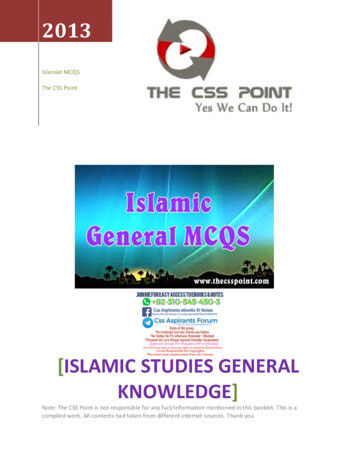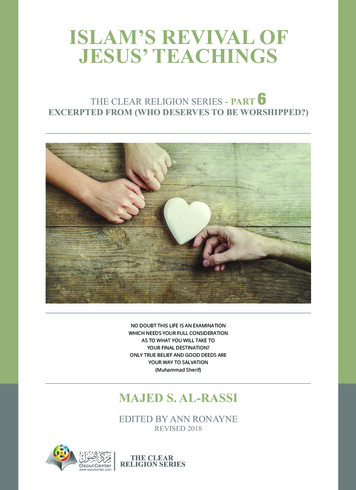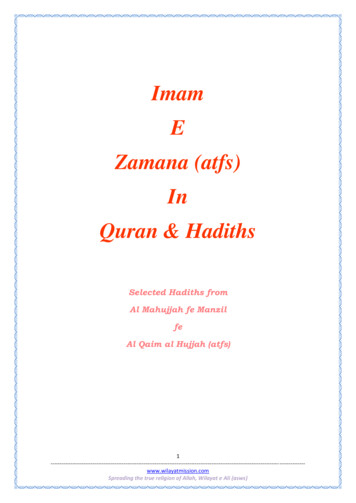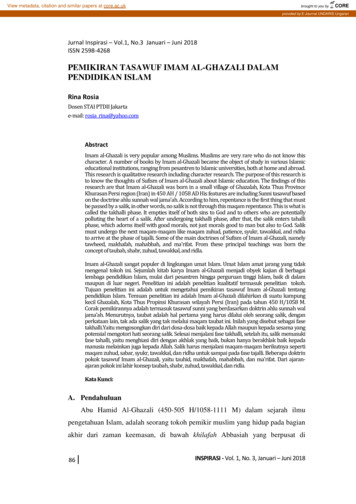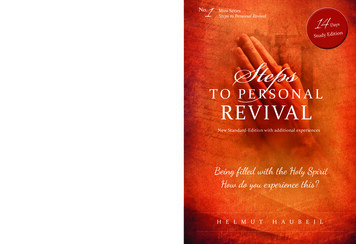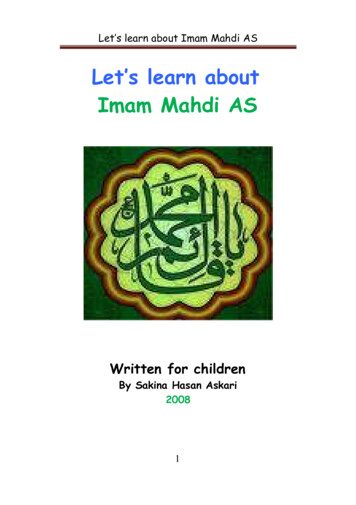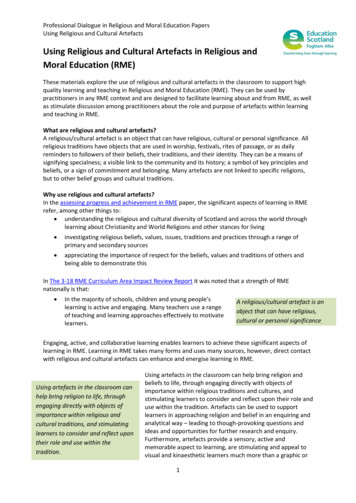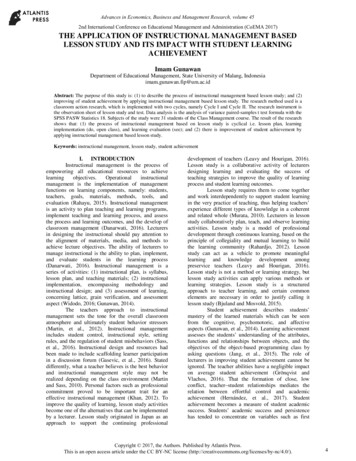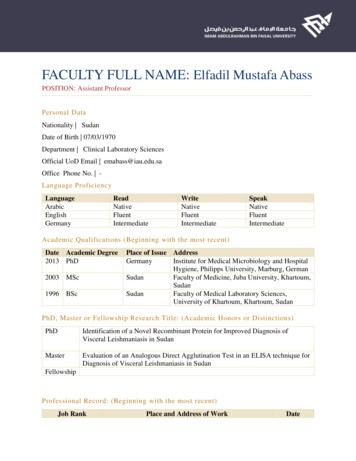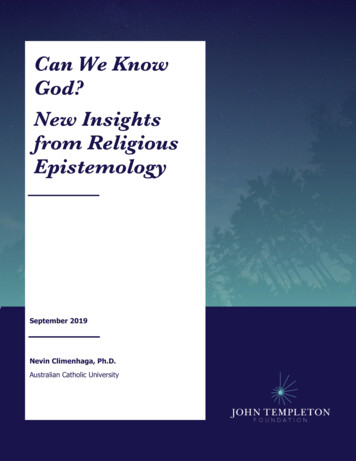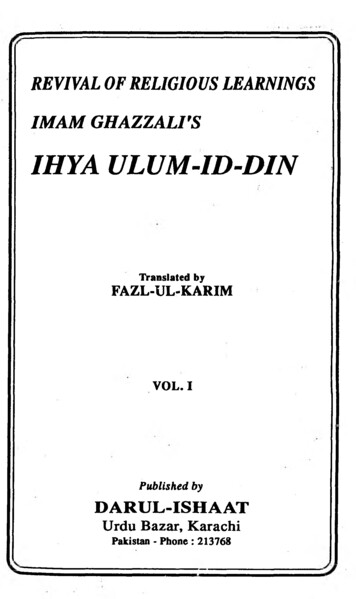
Transcription
REVIVAL OF RELIGIOUS LEARNINGSIM A M G H A ZZA LV SIHYA UL UM-ID-DINTranslated byFAZL-UL-KARIMVOL. IPublished byDARUL-ISHAATUrdu Bazar, KarachiPakistan Phone : 213768
j Rights of composing reserved PublisherDARUL-ISHAATURDU BAZAR KARACHI-PAKISTAN.Tel: 213768 - 2631861First Edition: 1993Composing a t : KODWAVI COMPOSING CENTREPakistan Chowk, Karachi.DISTRIBUTORS;Bait-ul-Quran Urdu Bazar Karachi-1Idara Tul Ma'arif, Darul Uloom Korangi Karachi-14Maktaba Darul Uloon Darul Uloom Korangi Karachi-14Idara Tul Quran 437/D, G.E. Lasbella Karachi-5Idara-e-Islamiat 190 Anar Kali Lahore.also available at:-Siddiqui Trust Al-Manzar ApartmentsLasbella Karacfu-5Printed A t:AHMAD PRINTING CORPORATION KARACHI.
Vol-IKNOWLEDGE3About the BookThe book is the English version of Imam Ghazzali's IhyaUlum-ud-Dir. It deals with worship and divine service.Imam Abu-Hamid al-Ghazzali is unquestionably thegreatest theologian of Islam and one of its noblest and mostoriginal thinkers. He was bom in 1058 A.D. at Tu s, wherehe diedin 1111. He reproduced in his religious experience all thespiritual phases developed by Islam.Starting his relgious life as orthodox, Al-Ghazzali soonturned Sufi, and when still under twenty he had broken with allthe past. In 1091 he was appointed lecturer at the Nizamiyah inBaghdad, where he became a sceptic. Four year later he returnedto Sufism after a terrific spiritual struggle that left him a physicalwreck. Intellectualism had failed him. As a dervish he roamedfrom place to place enjoying peace of soul and acquiescence ofmind. After about twelve years of retirement in various places,including two years of retreat in Syria and a holy pilgrimage, hereturned to Baghdad to preach and teach. There he composed hismasterpiece lyha Ulum-id-Din (the revivification of the sciencesof religion).The mysticism of this work vitalized the law its orthodoxyleavened the doctrine of Islam. In it and such other works of hisas Falihal-al-U lutn, Tahafut o f Falasifah, Iqtisad fi-al-Itiqad,orthodox speculation reached its culminating point.
THE BOOK OF WORSHIPCONTENTSPrefacePreface of Imam GazzaliCHAPTER IAcquisition of KnowledgeExcellence of LearningPraiseworthy and blameworthy learningsFour ImamsMeanings of some words now changedManners to be observed by teachers and studentsSigns of the learned of the HereafterIntellect and its noble natureCHAPTER IIFoundation of BeliefProof of beliefAttributes and actions of GodRules of articles of beliefCHAPTER IIIMysteries of CleanlinessPurification from impuritesPurification of body and mindClieansing the external Bodily growthsCHAPTERIVSecrets of prayerStories of prayer of God fearing menMerits of Jumma PrayerOptional prayersCHAPTER VSecrets of Zakat and charitiesSome subtle rules of ZakatMerits of optional CharityCHAPTER VISecrets of FastingOptional fasts and its rulesCHAPTER VIISecrets of PilgrimageTen secret things of HajCHAPTER VIH Excellence of the QuranExternal and internal rules of recitingIndividual InterpretationCHAPTER IXZikr and InvocationsRules of invocationsInvocations of sagesCHAPTER XActions after division of TimesMerits of Night 4925*)
THE BOOK OF WORSHIPPREFACEThrough the unbounded grace of the Almighty God andblessings of the greatest Apostle of God, the English version ofthe Book of worship of the world renowned Ihyaul Ulum(Revival of religious learning) of Imam Ghazzali, the greatestthinker of the world of Islam, the Proof of Islam, the famous Sufiand devout, has now been published in full. This book Ihya is asea of knowledge full of reasons and arguments, full of Quranicverses, traditions of the Holy Prophet and of the companions andthe famous saints of early ages. Each subject was supported bythe Quran, traditions and sayings of the learned sages and wisemen and established by reasons and arguments.As the great Imam belonged originally to the Shafeyi Sunnisect, some of the religious doctrines will be found in line withthat sect, but nevertheless its importance is very great. In hisadvanced age, the Imam was not a blind follower of sects butfollowed his independent thinking and as such indirectlycreated a sect of his own. As the world is advancing with evernew ideas and scientific discoveries, so also this work is full ofnovel and great ideas and scientific discoveries and therebythe Imam revived truly the religious sciences and gave theman impetus never given by his predecessors in such a manner.He saved Islam from the currents and cross currents ofdevilish thoughts and pagan ideas that inperceptibly enteredin to Islam and c le a rly show ed th eir fa lla c ie s an dmisconceptions. For this reason, he was given the title ofHujjatul Islam or the Proof of Islam. His thoughts prevailedupon those savants who came after him. Had not the Almightyblessed him with the necklace of reason and intellect, the truebelief of Islam would have been carried away by the strongcurrent of irreligious and misguided thoughts.True it is that there are many weak traditions in this book, butat the same time it should be remembered that the authors of sixauthentic traditional books specially Bukhari and Muslimselected some few thousand traditions as most of them were notproved to have been founded by trustworthy narrators from theHoly Prophet down to the narrator or did not meet with all therules laid down for an authentic tradition. For want of proof,
8REVIVAL OF RELIGIOUS LEARNINGSVol-Imany guilty persons are acquitted. For that, it cannot be said thatall acquitted persons are innocent So in this perspective, thetraditions in the Ihya should be regarded. Had Imam Ghazzalinot found them trusworthy, he would not have incorporatedthem in his book.The present translation is an attempt to bring out a completetranslation of Ihya in English in four Books. The first book dealswith worship and divine service, the second book with worldlyusages, the third book with destructive evils and the fourth bookwith constructive virtues. Ihya in original is a book in Arabiccomprising four parts and its abridged addition in Persian wastermed by the author himself as 'Kimiyae Sa'adat' or theTouchstone of fortune. Unnecessary arguments of different sectsprevalent nearly one thousand years ago, some matters notneeded at the present time and some sayings of some sages of lessreputation have been omitted in the present English version. Thebook has been, however, translated into Bengali in full by theauthor himself without ommission.SHORT LIFE OF IMAM GHAZZALIImam Ghazzali was bom in 450 A.H. (1058 A.D.) in thevillage Taberan in the district of Taus in Persia and his name isAbu Hamid Muhammad. His title is Hujjatul Islam or Proof ofIslam and his dynastic title is Ghazzali. His father was not afamous person but his grand father was one of the leading men ofthat age. His father died while he was young leaving him underthe care of his mother and grand father. Ghazzal is said to be thename of a village in the district of Taus in the province ofKhorasan in Persia. According to Maulana Shibli Nomani, hisancestors had the business of weaving (Ghazzal) arid thereforehe retained his family title Ghazzali (weaver).HIS EDUCATION: At the time of the death of Ghazzali'sfather, he entrusted the education of his two sons Muhammadand Ahmad to one of his trusted friends. The latter imparted tothem primary education and then sent them to a private Maktab.The boys within a short time committed the whole Quran tomemory and after that began to learn Arabic.They were then adm itted in a free M adrasha. A ftersometime, Imam Ghazzali left his native village for higher
Vol-IREVIVAL OF RELIGIOUS LEARNINGS9education for Zarzan and began to study under a great earnedman Imam Abu Nasr Ismail. He used to take notes of his lecturesbut m a certain journey he was robbed of these notes by somedacoits along with his other belongings. He took courage, wentto the chief of the robbers and begged of the notes only to bereturned to him. It was returned to him at his earnest entreaties.Then he joined Nizamia Madrasha at Nishapur which was areputed seat of learning and a great educationist named ImamulHaramain was its principal. He had 400 students of whom threewere most noted - Harrasi, Ahmad-b-Muhammad and ImamGhazzali. The latter became so much grieved at his death that heleft Nishapur and went to Baghdad, the capital of the Caliphs. Hewas then a young man of 28 years of age.At Baghdad, he was appointed principal of NizamiyahMadrasha by Nizamul Mulk the chief vizier of the Turkish rulerMalek Shah. Being thus appointed at an early age to such a highpost, his popularity as a great learned man spread far and wideand the rulers and the chieftains used to consult him in stateaffairs and theological matters.LECTURES OF IMAM GHAZZALI: In the lectures of theImam, hundreds of learned men and dignitaries of the State andeven the ruling princes attended. His lectures were full ofarguments and reasons and they were mostly recorded bySayeed-b-Fares and Ibn Lobban. They recorded nearly 183 of hisle c tu re s w hich w ere com pleted in a book nam edMajalesse-Ghazzali.The great Imam then turned his mind to gain spiritualheights and the circumstances leading to it were recorded byhim in his book Munkezum Minaddalal (Deliverance fromerror). He was a follower of Imam Shafeyi in his early age butin Baghdad he mixed freely with the peoples of all sects andthoughts and ideas. There were then the ShTas, the Sunnis,Zindiqs, Magians, Scholastic theologians, Christians, Jews,atheists fire-worshippers and idol worshippes. There were alsothe Deists, the Materialists, the Naturalists, the philosophers.They used to meet in mutual wars of argumentations anddebates. This had suet) an effect in the mind of the Imam that hiswhole life became changed and he began to search for truth witha free mind. His old ideas disappeared and he began to live in
10REVIVAL OF RELIGIOUS LEARNINGSVol-Idoubts. He then became inclined to Sufism but here practicalactions were more required than mere belief. Beng imbued withsuch an idea, he gave up his lucrative post at Baghdad, wore Sufidress and left Baghdad suddenly one night in 488 A.H.He then went to Damascus and closetted himself in a room ofits mosque and began attentively the divine services, meditationsand Zikr. Thus he spent here two years in solitude. At the age of27 years, he was initiated by Pir'Abu Ali Farnedi who was thespiritual guide of also the vizier Nizamul Mulk. After two yearshe went to Jerusalem and visited the birth place of Jesus Christand in 499 A.H. he visited the holy shrine of Hazrat Abraham andmade there three promises:-1) he will not go to the Darbar of anyruler, 2) he will never accept their presentation, 3) he will not joinany religious debates. He fulfilled these promises up to his death.Then he went to Mecca for pilgrimage and visited alSo Medinaand stayed there for a long time. When he returned hdme, he wasrequested by the ruler to accept the post of the principal ofNizamia Madrashah and he accepted it. When the ruler wasassassinated by an assassin, he gave up the post and went to Tasand closetted himself in a khankah. The new ruler requested theImam to join his post of the principal but he declined the offer.He died at his native village Taberan on 14th Jamadis Sani in505 A.H. corresponding to 19th December 1111 A.D. Ibn Jauzinarrated a story about his death. He said: On Monday early in themorning he got up from his bed, performed his morning prayerand then sent a man to bring his coffin cloth. When it wasbrought, he lifted it up to his eyes and said: Lord's command is tobe obeyed. Saying this, he prolonged his legs and immediatelybreathed his last. The Imam left no son, but only daughters.HIS BOOKS: The Imam lived nearly 55; years and he beganto write books from his early age when he was 20 years old. Hetravelled for nearly 10 to 11 years and spent most of his time inreading, writing and teaching. Besides this, he had to reply tothousand letters which came from far and near for his decisionand opinion. He wrote nearly 400 books of which the followingare noted.THEOLOGY: Wasit (Shafeyi jurisprudence), Basit, Wajiz(Canon Law) (compendium), Bayanul Qaolaine li Shafeyi,Khulasatul Rasail (Quintessence of jurisprudence), Fkhtesarul
Vol-IREVIVAL OF RELIGIOUS LEARNINGS11Mukhtesar, Gayatul Gaur, Mazmatul Fatawah (collection of legaldecisions), Risalatul Qudsiyya (canon laws of Prophet).PRINCIPLES OF THEOLOGY: Tahsinul Muakhej, ShefayeAlii (cure of diseases), Mankhul, Mustastfa jurisprudence.JURISPRUDENCE: Khulasatul Fiqh (qu in tessen ce ofjurisprudence) Wajiz, Iqtisad-fil-I'tiqad (exposition of faith),Al-Qaestas Mustaqim.LOGIC: M izanul Amal, M ihakhul Nazar fil M onteq(whetstone of reflection on Logic), Mayatul Ilm (weighing scaleof science), Al-Ma'arif (Discourse on Logic). Mayarul Ilm fiFannil Manteq (the weighing scale of the science of logic).PHILOSOPHY: M aqasidu l F a la sifa h (aim of thePhilosophers), Munqezum Minaddalal (Deliverence from error),an autobiographical statement of his spiritual progress) KitabulArsayin (abridgement of Ihya), ResalatuI Laduniyya (Ilham andwahi).SCNOLASTIC THEOLOGY: Tahafatul falasifah (destructionof the philosophers), Iqtisad, Mustajhari (guide of novices),Iljam al Awam (v ilification of peoples), Faysatu l Zindiq(refutation of atheists), Fikhrot wal Ibrah (Meditation andcontemplation), A1 Hikmat (wisdom of God), Haqiqatur Ruh(realities of soul).SPIRITUAL AND MORAL: Ihyao Ulumiddin (Revival ofreligious learnings), Kimiyae Sa'adat (Touch stone of fortune),Akhlaklul Abrar (conduct of the pious), Jawaharul Quran (Jewelsof Quran), Minhajul Abedin (path of the devout), Mirajus Saleqin(steps for the sojourners), Bidayataul Hidayah (beginning ofguidance), Mishka tul Anwar (Niche of lights).TAFSIR: Yeakutut-Ta'wil (a commentary of the Quran in 40volumes now lost).Of the 400 books he com piled, some only have beenpreperved in many libraries of Europe, while the Muslims didnot accept them as they should have been accepted. Besides, theywent so far as to burn some of his books which were lost foreverto the world.
12REVIVAL OF RELIGIOUS LEARNINGSVol-IIHYA ULUMIDDIN: Revival of Religious sciences is am aster piece of Imam G hazzali. Abul Gafer Fersi was acontemporary of Imam Ghazzali. He said that a book like Ihyawas never compiled before. Imam Nodi said: Ihya is near theQuran. Shaikh Abu Muhammad said: If all the lights ofknowledge of the world are extinguished they can be revivedfrom Ihya. Shaikh Abdullah Idrees was a great saint. Hecommitted to memory the whole book Ihya. Shaikh Ali read it 25times from first to last and at the end of each reading gave a feastto the students and the poor. Many students of the Imamcommitted it to memory. Many saints regarded the book as aresult of Ilham or inspiration. The great saint Kutub Shaji one dayheld the book in his hand and said to the people: Do you knowwhich book is in my hand? Immediately he showed them thesigns of lashes on his back and said: I was not a supporter of thebook. Last night, Imam Ghazzali took me in presence of the HolyPropeht and inflicted on me these lashes on my back for mydisregard of the book. These are the signs of lashes on my back.IM AM GHAZZALI AND EUROPE: The books of ImamGhazzali was so much accepted and honoured in Europe thatthey preserved them in many libraries. But they did not receiveso much attention in Muslim countries. Some Muslim learnedmen even did not open their eyes to see them, but ratherprohibited the people to read them. For this reason, his books arerarely found in the libraries of Muslim countries. Mankhul is abook compiled by the Imam at his early age. Therein he wrotewith completely free and independent mind and was not a blindfollower of Mazhabs or sects. This book fell into disregard inMuslim countries only for this fault. Mankhul and Ihya wereordered to be burnt and it was translated into action. Europeaccep ted them w ith honour and preserved them fromdestruction. The book 'Maqasedul Falasefa' is not found inMuslim countries but it is preserved in the libraries of Spain,Europe also accepted his other books.GHAZZALI'S INFLUENCE: It is no exaggeration to say thatthe modern opinion about religion is much due to the influenceof the Imam's thoughts. The many books that were written afterhis death reflect greatly the thoughts of the great Imam. Hisviews on Sufism were accepted by the latter Sufis. After himMaulana Rumi, Ibne Rushd, Shah Waliullah and such other
Vol-IREVIVAL OF RELIGIOUS LEARNINGS13noted learn men wrote many books which resound with theopinions of Imam Ghazzali. In short, his thoughts reignedsupreme in their minds. His influence on Persian literature wasalso great. He himself wrote Kimiyae Saadat in Persian whichinfluenced to a great extent the minds of Maulana Runu. ShaikhSa'di, Farid Uddin Attar, Shiraaji, Hafez and other poets andSufis. The works of such a learned man held in high esteem by allshould be widely read and circulated. Mr. W att says: Ghazzalihas sometimes been acclaimed in both east and west as thegreatest Muslim thinker after Muhammad and he is by no meansunworthy of that great dignity.PREFACE OF IMAM GHAZZALITake whatever the Apostle gave you and keep away fromwhatever he forbade you - 5 9 :7 Quran.' Firstly, I begin with the praise of God though our praise isguide insufficient and meager in relation to His real glory.Secondly, I invoke His blessings on all the prophets and speciallyon His last and greatest Prophet Muhammad (peace be on themall). Thirdly;'I pray for His help and grace that there shouldremain in me firm will and incentive for writing the book IhayoUlumiddin or the Revival of religious sciences.Fourthly, O defamer, O heedles, O one denying truth, Godhas Removed from my tongue the tie of silence and put on myneck the necklace of arguments and reasons. It is my duty toreply to what you argue. In other words, you have closed youreyes from open truths and taken help from whatever is void anduntrue and praise ignorance. If a man wants to rem ovesomething from the evil practice and habits of men or expresseshis wish to translate his learning into action in order that theAlmighty may prefer to purify his soul, let him keep himselfengaged in divine services and seek to atone for the sins that hecom m itted in his past life and for which he has becomedespaired. Let him keep aloof from the society of those personsabout whom the Holy Prophet said: The greatest punishment onthe Resurrection Day will be meted out to that learned manwhom God has not given any benefit to his learning.It is my firm conviction that there is no reason for yourrefusal to accept the truth except what has been stated below. In
14REVIVAL OF RELIGIOUS LEARNINGSVol-Iother words, the disease which entered into the minds of themajority of people has also entered your mind. The meaning.isthat they have given up the rules and regulations for acquiring ranksin the hereafter. They do not know that this affair is very serious andgrave, tl\at the hereafter is coming forward and this world is resedingbackward, that death is near and the journey is long, that provision i»scanty, dangers are great but the paths areblocked.The learnings and actions which have got no connection withGod are fit'to be entirely rejected by the wise and those who seekwisdom. It is very difficult for a traveller to the next world totread the paths, because there are injurious and destructiveelements on the way but there are no passport and means to crossthem. The learned are the guides to these paths. They are theheirs of the prophets. Time has slipped out of their hands. Thosewho are slaves to evil habits are alive. The devil is powerful overthe majority among them and various kinds of sins misguidethem. Almost every one among them is engrossed in the luxuriesof this world and its comforts and enjoyments. For this reason,the majority of them consider good as bad and bad as good. Eventhe religious learnings and sciences have become obsolete. Thelights of guidance have almost disappeared from this world.They duped the people to believe that there is no other sciencethan that of Flah (Jurisprudence). These are the laws ofadministration which help the judges in the administration ofjustice and the rulers in the administration of their countries.They say that there is no learning except that of Munazara ordebates. The present learned man cherishes hope of victory overhis adversary and seeks means to make him silent. Or theyinformed the people that there is no learning except the science o fscholastic theology by help of which a speaker seeks to influencethe minds of the public. They see no other science except thesethree sciences. The sciences of the next world and the learnings ofthe sages of early times have disappeared from the people andthe learning which was described by God in His Holy Book astheology, wisdom, light and guidance has been immerged in thedeepest recess of forgetfulness.When such is the condition of the religion, such downfall andcatastrophe, I have thought it prudent to writs this book entitled,Ihyao Ulumiddin (Revival of religions Sciences). By this book,the path of early Muslim sages has been opened and the
Vol-IREVIVAL OF RELIGIOUS LEARNINGS15impediments that lay in the path of acquiring learnings beneficialto the prophets and sages have been removed.I have divided this Ihya into four books - 1) the Book ofworship, 2) the Book of worldly usages, 3) the Book of destructiveevils, 4) and the Book of constructive virtues. I have discussed thechapter of knowledge at the very beginning as it is of extremeimportance. It is necessary to discuss such learning at the outsetwhich is a great help towards divine service according to a sayingof the Holy Prophet. He said: To seek learning is compulsory onevery Muslim. I began with the chapter on knowledge in order toseparate the useful knowledge from the harmful knowledge asthe Prophet said: We Seek refuge to God from the knowledgewhich is not useful.(1) T h e B o o k o f w o rsh ip co m p rise s ten c h a p te rs (1) Knowledge, (2) Articles of Faith, (3) Secrets of Purity,(4) Secrets of Prayer, (5) Secrets of Alms-giving, (6) Secrets ofFasting, (7) Secrets of Pilgrimage, (8) Rules of Quran-reading,(9) Rules of invocations and supplications and (10) observance ofdaily duties according to fixed times.(2) The Book of worldly usages consists of ten chapters (1) rules of eating and drinking, (2) rules of marriage, (3) rules ofearning livelihood, (4) lawful and unlawful things, (5) rules ofcompanionship and brotherhood (6) rules of habitation insolitude, (7) rules of journey, (8) music and ecstasy, (9) rules ofenjoining good and forbidding evil, (10) rules of living asexemplified by the character and conduct of the Prophet. ,(3) The Book of Destructive evils comprises ten chapters (1) wonders of soul, (2) discipline of soul, (3) harms of stomachand sexual passion, (4) harms of tongue, harms of anger, hatredand envy, (6) evils of the world, (7) evils o f wealth andmiserliness, (8) evils of show and pomp, (9) evils of self- conceitand pride and (10) evils of vanity.(4) The Book of constructive virtues comprises ten chapters- repentance, (2) patience and gratefulness, (3) fear and hope,(4) poverty and asceticism, (5) Tauhid (unity of god) and Godreliance, (6) love and contentment, (7) intention, truthfulnessand sincerity, (7) self-examination and self-accounting, (9)meditation, (10) death and ponder over death.
16REVIVAL OF RELIGIOUS LEARNINGSVol-ISome people wrote some books on these subjects, but thisbook has got five special characteristics which are not found inthose books. Firstly, I have opened by the grace of God what theyclosed up and I have written in detail what they kept secret.Secondly, I have arranged what they kept scattered and I havebrought together what they kept separate. Thirdly, I have madeshort what they made long and corrected what they approved.Fourthly, I have deleted what they repeated. Fifthly, I have madethis book easy to understand after disclosing the subtle matters.These are the five specialities of this book.I have placed the foundation of this work on four books fortwo reasons. The first basic reason is that I have incorporated inthis book well-arranged rules and their real nature, so that theymay be easily understood, as the knowledge by which the nextworld is known is of two kinds - knowledge of outwardbehaviours and usages and the knowledge of revelation,inspiration, secret and subtle matters. What I mean by thisknowledge is the knowledge for attaining the submum bonum orthe ultimate object of life. What I understand by the science ofoutward behaviours and usages is the knowledge' of practicalrelig io n attended w ith action s in accordance w ith thatknowledge. The object of this work is only to narrate the scienceof practical religion and usages and not to narrate the science ofrevelation and inspiration, as there is no permission to put thelatter into black and white though the science of revelation is theultimate object of those who search after truth and the mostcoveted matter in the eye of the extremely truthful, and the bestway of acquiring knowledge of worldly uses. The Holy Prophetdid not speak anything about the science of revelation exceptthrough signs and symbols, because he knew that the wisdom ofmen to understand it is very little. There is no means of thelearned other than the path of the prophets, as the learned are theheirs of the prophets. The science of practical religion are of twokinds-open science of the actions of the physical senses and thesecret science of the functions of the heart. The actions whichkeep connection with the physical senses are the actions of habitsor usages of life. The heart which comes from the unseen worldand is removed ultimately from the senses is influenced by eitherthe praiseworthy virtues or the blame-worthy vices. In short, thescience of practical religion is divided into open and secretsciences. The open science and usages of life. The secret science
Vol-IREVIVAL OF RELIGIOUS LEARNINGS17keeps connection with the condition of heart and its qualities andis sub-divided into praise-worthy virtues and blame-worthyvices.The second basic reason is this. I see a great enthusiasm ofstudents for study of jurisprudence or Fiqh. To those who do notfear God, jurisprudence has turned into an object of pride and ameans for acquiring name and fame. Jurisprudence is of fourkins. As the objects which adorn the dear things are also dear, Ithink it better that this book should be modelled into the form ofFigh or jurisprudence, so that the minds may be inclined to it. Forthis reason, one who wants to attract the attention of the minds ofsom e m en to the science of m edicine rem odels it afterastronomical tests and writes a book after naming 'Tablets ofHealth'. So also I have adopted some measures in this work, sothat the minds of the people are attracted towards such learningwhich is beneficial to human life. As the minds of the people areattracted to the science of medicine for preservation of the healthof body, so also it is necessary that the minds of the people areattracted to the treatment of the diseases of soul and mind inexpectation of a happy and prosperous life in the next worldwhich will last forever and forever. Physical happiness is shortand transient as compared to spiritual happiness in the hereafter.Physique is mortal while soul is immortal. So I pray to theAlmighty for his help and succour for writing and completingthis book Ihyao Ulumiddin as He is the most Compassionate, themost Merciful.
CHAPTER IACQUISITION OF KNOWLEDGESECTION 1 - EXCELLENCE OF LEARNINGPROOF OF THE QURAN: God says: God, angels and thoselearned men who stand on justice bear testimony that there is nodeity but He - 3 :18. Now look, O dear readers, how God beganattestation first by Himself, then by His angels and then by thelearned. It is understood from this veTse that the rank of thelearned and their honour are much high. God says: Those whoare believers among you and the learned, God will increase theirrank - 58 :12. Hazrat Ibn Abbas said about them: The rank of thelearned is seven hundred times more than that of the believers,and the ofference between the two ranks is the distance of thepath of five hundred years. God says: Are those who are learnedequal to the illiterate - 39 : 9 ? God says: The learned among Hisservants fear God most - 35 :28. God says: Say, God is sufficientas a witness between me and you and those who have gotknowledge of the Quran -1 3 : 43. God says: But those who hadbeen granted knowledge said: Alas for you, the reward of God isbest for those who believe and do good - 28:80.God says: These parables We set forth for men and noneunderstands them except the learned - 29 : 42. God says: If theyhad only referred it to the Apostle and to those charged withauthority among them, those of them who would investigate itwould have know it - 4 : 93. God thus made knowledgedependent upon their efforts. In the practical religion, God'scommands have been placed upon the investigation of thelearned and their rank with the prophets for propagation ofGod's commands. God says: O the children of Adam! I have sentdown to you raiment to cover your shame and adornment to you,but the raiment of piety is best - 7 : 25. God says: I have sent tothem a book and with knowledge I explained it in detail, a guideand a mercy to all who believe - 7 : 52. God says: I shall recounttheir story with knowledge - 7 :6 . God says: It is a clear sign in thehearts of those to whom knowledge has reached - 29 : 48. Godsays: He created man and taught him to speak - 55; 2.HADIS: The Holy Prophet said: God gives knowledge ofreligion and guidance to truth to one whose good He intends. He
Vol-IKNOWLEDG
The book is the English version of Imam Ghazzali's Ihya Ulum-ud-Dir. It deals with worship and divine service. Imam Abu-Hamid al-Ghazzali is unquestionably the greatest theologian of Islam and one of its noblest and most original thinkers. He was bom in 1058 A.D. at Tu s, wherehe died in 1111. He reproduced in his religious experience all the
